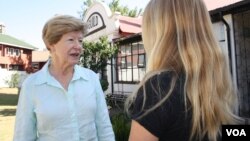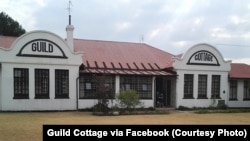The potential foster parents seated in the lounge of the Colonial-era house in Parktown, Johannesburg, can’t help staring at the teenage girl bouncing past them.
She’s striking, with long, blond hair, a wide smile, azure eyes and a vivacious personality. She greets the strangers confidently.
"She was sexually abused by her father with her mother’s agreement, from very, very young,” Guild Cottage Director Trish Heslop said in the privacy of her office.
“As a little girl of about 5, she was deflecting abuse from her [three] younger siblings. She took the brunt of it — sexual abuse, emotional abuse, physical abuse, beaten with a stick. …”
Heslop explained that child welfare authorities removed Jessica — not her real name — from this brutal environment when she was 8.
“She was put into foster care, where she was again sexually abused, by her foster father. Again she was removed and put into various places of safety. Then she came to us, because some of her behavior was hard for her very religious foster family to bear," Heslop said. "But fortunately she’s a child with great resilience, and a child who’s smart.”
Lack of treatment centers
Jessica, now 15, is one of an estimated 4 million children younger than 16 in South Africa who’ve suffered sexual abuse, said Heslop, quoting data from various sources, including the police.
Despite this statistic, and research by the country’s Medical Research Council saying half the nation’s children will be sexually abused before age 18, Guild Cottage is the only specialist residential treatment center for such traumatized youngsters in South Africa.
“Of the horrific numbers of children that get harmed in this way, we only have the funding and facilities to help 18 children at a time,” Heslop said.
The residents are age 7 to 16.
“Most of the sexual abuse is incest. And most of the kids we have here are children who have been sexually abused within the family. Most of those are stepfathers, mother’s new partner, sometimes brothers, grandfathers, uncles, neighbors,” Heslop said.
Memories of children
Over the years she’s dealt with many tragic cases, and she said many of those children were always on her mind, even though they’re adults now.
“The first child that crops up in my mind is a little girl we had here from the age of 7. Her earliest memory — and memories only become concreted in when you’re about 3 years of age — was of being prostituted by her mother," Heslop said.
She said the child’s mother would sell her daughter to men for sex.
Heslop emphasized that sexual abuse knows no boundaries, adding that residents of Guild Cottage were from diverse backgrounds.
“It crosses every economic, religious, class, cultural boundary. So we have children from very wealthy homes, we have children who live in the shacks in townships; we have children who come from very religious backgrounds,” she said.
'Almost destroyed herself'
Unlike the majority of abused youngsters in South Africa, who are condemned to lives of suffering, Jessica received help at Guild Cottage to overcome her past.
This includes psychological counseling and environmental therapy, through which experts taught her independence, responsibility and appropriate boundaries, behavior and life skills.
The cottage’s psychologists and other therapists forge very close relationships with girls like Jessica in an atmosphere of trust, caring and love.
But Heslop said Jessica “almost didn’t make it.”
After arriving at the cottage about three years ago, and following initial intensive counseling and therapy, Jessica was placed in a school.
Heslop said because of Jessica's history, and her desire to fit in with her new peers, she almost destroyed herself.
"In her first year in high school, because she tries to please, she got involved in some of the drugs that were around, and we got her into rehab," Heslop said.
Jessica said she’ll never forget the staff of Guild Cottage for their patience, and for forgiving her for her mistakes.
“I’ve messed up a lot and they gave me chances. They’ve loved me and they’ve always been there,” she said, looking at Heslop with affection.
Accounting ambitions
Jessica’s now thriving, Heslop said.
“She values education enormously. She is involved in sports in school. She is just a girl who works so hard … and she is prepared to succeed at whatever she does. She studies. … And the school loves her because this is a child who’s polite, she’s respectful; she’s a good role model for the other kids," Helsop said.
Although Jessica hasn’t forgotten the “bad times” and how “worthless” she once felt, she’s now an assertive young woman determined to succeed.
“My favorite subjects [are] math and accounting, because I want to become an accountant one day,” she told VOA, laughing.
"I believe she has a very good future because she won’t allow her past to control her, and we find that kids like that usually succeed,” Heslop said.
Jessica said that if it weren’t for Guild Cottage, she’d probably be an “empty failure,” or even dead.
“I wouldn’t have realized how important school is and how important it is to not hurt yourself, and to do bad stuff to yourself or to use drugs and stuff to kill yourself," she said, adding, "I’ll leave Guild Cottage but I’ll always come back because I’ll miss them. They’re part of my life; they’ve become my family."
Lack of funding
Jessica said it’s her dream to one day establish an organization similar to the cottage, to help children who are “much worse off” than she was.
The staff at the cottage "helped me and they showed me mercy,” she said. “And they love us, so I’ll want to be like that and help people, because I got helped. So why not help them to see a brighter future, to leave the darkness behind and move on?" she said.
But will Guild Cottage “move on” into the future?
Heslop said the institution’s survival was threatened by lack of funding.
“We’re a small organization, so our budget is small. This year it’s 2.8 million rands [a little more than $200,000],” she said.
The government provides only a quarter of the funds Guild Cottage needs. It relies on private donations for the balance.
“I beg a lot; I’m very good at begging,” Heslop said, with a somewhat ironic smile. “But people are very tired of giving money. This is a country that has many, many needs and not enough money to spread around. … At the moment we’re deep in a hole; we’re kind of trying to dig our way out.”
The state maintains that Guild Cottage’s programs are too expensive, and if it made its services cheaper, chiefly by closing some of its programs, it would be able to accommodate more children.
Keep their standards
But that’s not an attitude that Heslop and her staff are able to tolerate.
“We don’t believe in warehousing children," Heslop said. "We believe in giving children experiences, normalizing them, sending them to schools, letting them go on school camps, to go to the movies ... and dressing them well. They can’t wear rags; they’ve got to look like they belong in the community.”
“Yes, our program may be expensive," she said, "but it’s no different to what we would want for any of our own children in the same circumstances.”
And so, because of its policy to provide nothing but quality for its girls, Guild Cottage remains locked in a funding crisis.
Piles of proposals to potential donors teeter on Heslop’s desk. She hopes some will soon be successful, giving one of South Africa’s most unique child care facilities the money to stay open — a cash injection that will allow it to create more success stories similar to Jessica's.





